Key takeaways:
- Breaking down the book launch into manageable steps is crucial for organization and confidence.
- Effective marketing blends social media and email outreach, enhanced by partnerships with other authors.
- Engaging authentically with readers fosters community and provides valuable feedback for growth.
- Timing, a dedicated launch team, and planning ahead are key lessons for successful future launches.
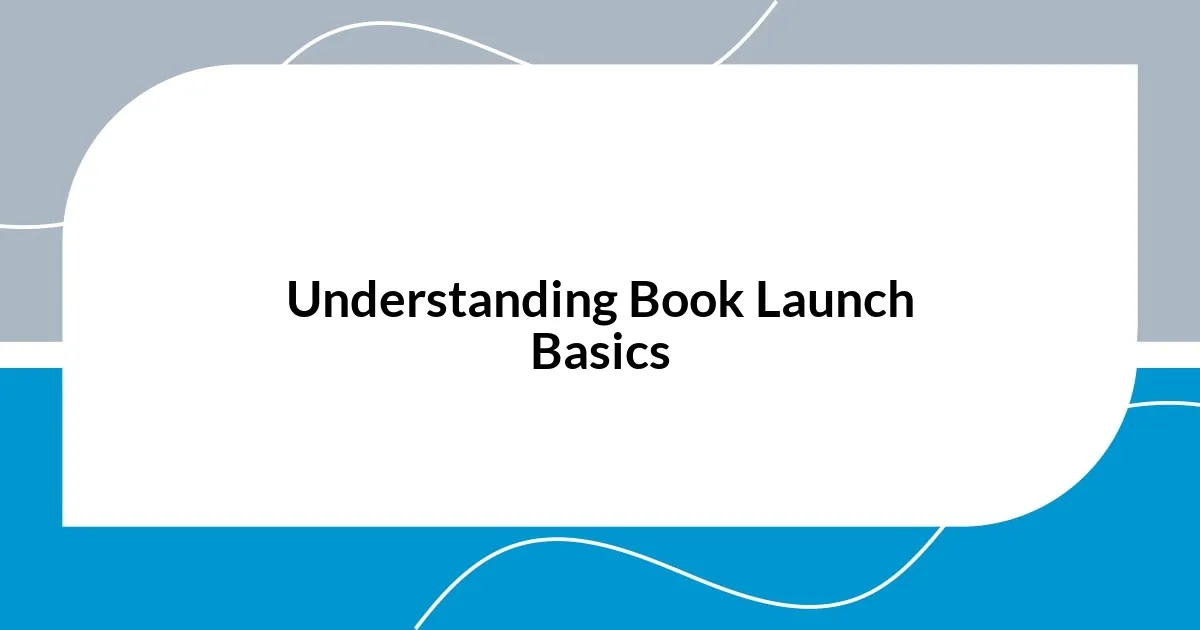
Understanding Book Launch Basics
Understanding the basics of a book launch is essential for any author. I remember sitting down with a timeline, feeling both excited and a bit overwhelmed. How do you even start? It’s easy to get lost in the details, but the key is to break it down into manageable steps.
One important aspect is the importance of a solid launch plan. I recall spending late nights piecing together a marketing strategy, wrestling with questions like: Who’s my audience? Where should I promote my book? Each decision felt critical, yet I learned that the right mix of platforms can create a significant buzz.
Engaging with readers before and after the launch creates a sense of community. I found myself reaching out to my network, sharing sneak peeks, and anticipating their responses. It truly felt like building something together, which added an emotional layer to the entire experience—something I hadn’t expected but was a highlight of my journey.
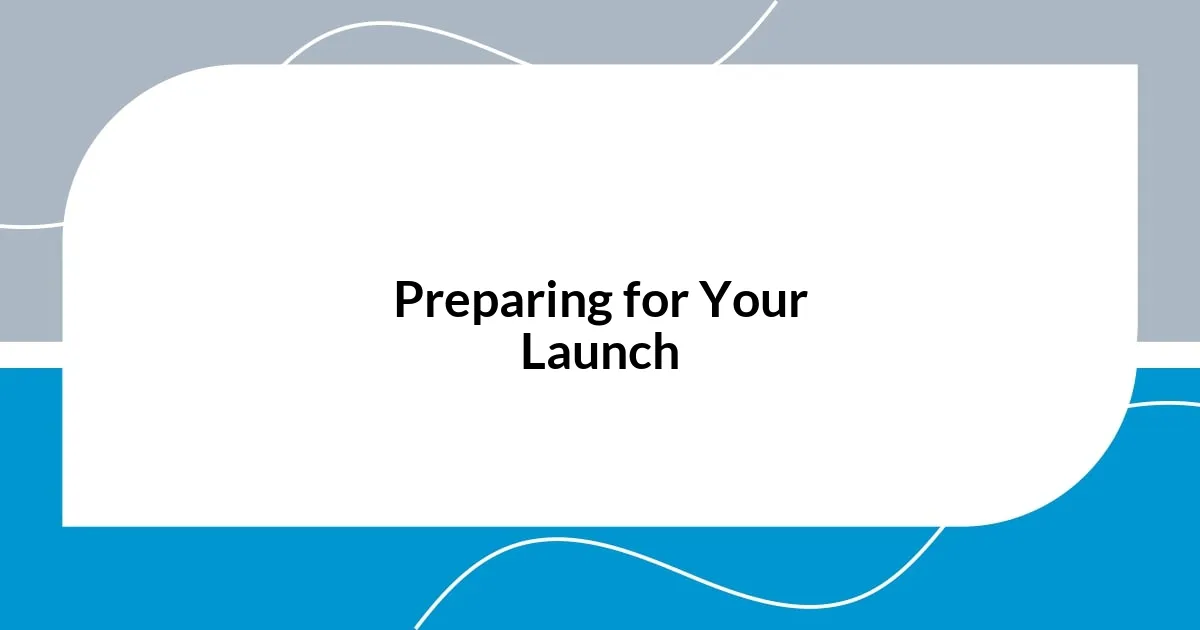
Preparing for Your Launch
When it came to preparing for my book launch, I quickly discovered that organization was key. I created a detailed checklist to cover everything from budgeting for promotional materials to setting up social media campaigns. Breaking tasks into smaller, actionable items not only lightened the load but also gave me a sense of accomplishment as I checked things off.
- Define your target audience clearly.
- Schedule regular promotional posts leading up to the launch.
- Plan a virtual or in-person event to celebrate the release.
- Gather a list of influential readers and potential reviewers for early buzz.
- Ensure that all your promotional materials align with your book’s theme and message.
Each of these steps contributed uniquely to my preparation, helping me feel more confident as the launch date approached. I remember how rewarding it felt to see my efforts come together, and that excitement fueled my motivation even more.
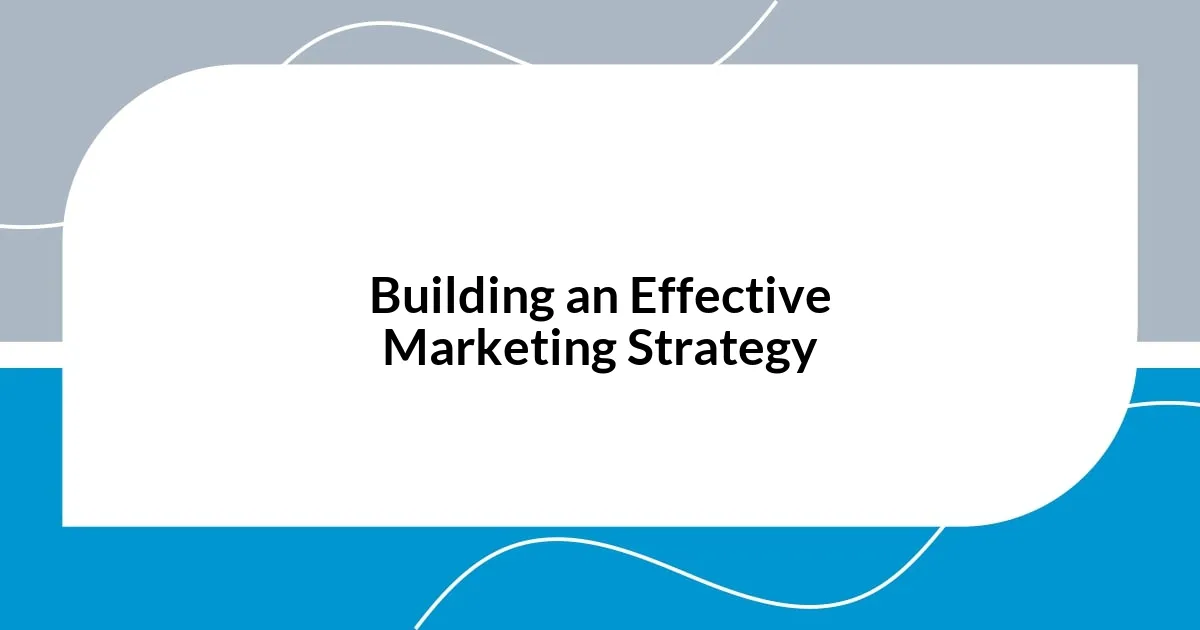
Building an Effective Marketing Strategy
Building an effective marketing strategy for my book was a bit like navigating uncharted waters. Initially, I was overwhelmed by the sheer number of options. Should I focus more on social media or email marketing? In my case, blending both worked wonders. I remember crafting engaging posts for Instagram while also sending personalized emails to my mailing list, which kept my audience involved and excited. It created a dynamic synergy that fueled interest right up to the launch day.
Additionally, I found leveraging partnerships was a game-changer. Collaborating with other authors and influencers expanded my reach inexplicably. I’ll never forget the thrill of seeing my book featured on a popular blog or social media account. It’s as if my book had a new life, introduced to readers who may have never stumbled upon it otherwise. The supportive community I built during this time led to shared promotional efforts, amplifying our messages and creating a more significant impact collectively.
Tracking my marketing efforts provided invaluable insights and helped me adjust my strategy in real-time. Using analytics tools allowed me to see what was resonating with my audience. For instance, I noticed that certain posts generated more engagement, prompting me to pivot my focus. I learned that flexibility combined with data-driven decisions was essential in the fluctuating landscape of book marketing.
| Strategy | Description |
|---|---|
| Social Media Marketing | Engaging posts and visuals on platforms like Instagram generated pre-launch buzz among followers. |
| Email Marketing | Personalized emails to my list kept my audience informed and invested in the launch journey. |
| Partnerships | Collaborating with other authors expanded my access to new audiences and built a supportive community. |
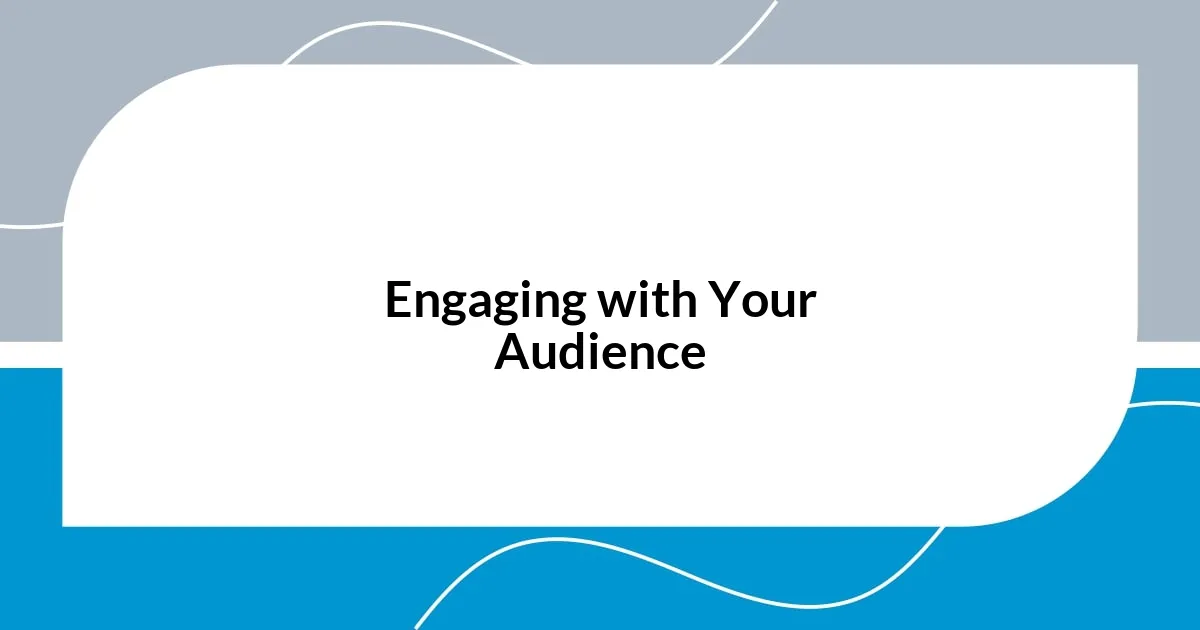
Engaging with Your Audience
Engaging with my audience was one of the most exhilarating parts of my book launch. I vividly recall hosting a Q&A session on Instagram Live—my heart raced as I saw familiar names popping up in the comments. I was amazed by their questions and enthusiasm; it felt like I was diving into a deep conversation with friends, rather than just talking at them. Have you ever felt that rush of connection? It reminded me how important it is to create spaces where readers feel comfortable reaching out and sharing their thoughts.
Building authentic relationships was essential for engagement. I took time to reply to comments and messages with genuine appreciation. One memorable experience was when a reader shared how a passage from my book resonated with their life. That moment brought a wave of humbling gratitude; knowing my words could touch someone else’s heart was a profound motivation. It’s those authentic interactions that stick with both you and your audience, making them feel valued and connected to your story.
I also learned the importance of feedback from my readers. After the launch, I sent out a simple survey asking for their thoughts. The responses helped me see what worked and what didn’t. Imagine putting so much effort into something, only to discover the parts that truly resonated! It was eye-opening and invaluable, showing me how to better connect in my future projects. Engaging with your audience is not just about creating buzz; it’s about listening, learning, and evolving together.
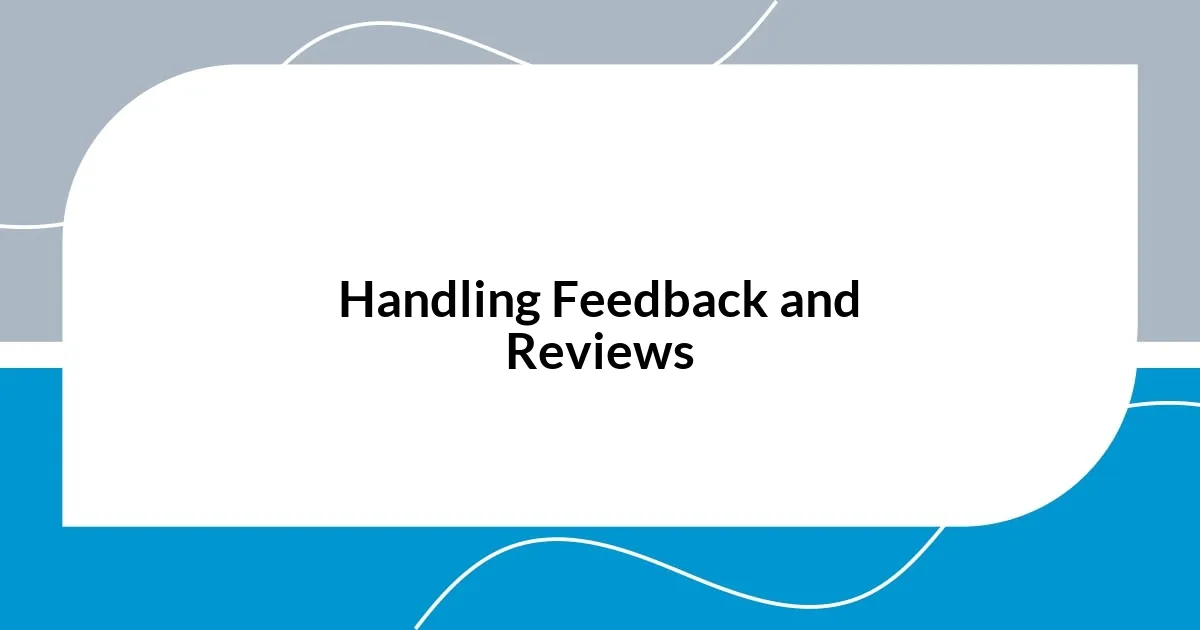
Handling Feedback and Reviews
Handling feedback and reviews can be a rollercoaster of emotions. I remember that sinking feeling when I read my first negative review. It stung like a bee, and I had to remind myself that every writer faces criticism. In my experience, channeling those feelings into constructive action made all the difference. I worked hard to extract valuable lessons from each review rather than letting them linger as bruises on my ego.
Positive feedback, on the other hand, is a warm hug for the soul. There’s nothing quite like receiving a heartfelt message from a reader who found solace in your words. I recall one particular review that ignited a spark within me—it described how a character in my book had inspired someone to pursue their dreams. Moments like that make you realize why you write in the first place! How do you think feedback shapes your growth as a writer? For me, it’s about turning every comment into a stepping stone for improvement.
I also learned the importance of responding to feedback graciously. Initially, I hesitated to engage with critics, fearing more backlash, but I discovered that addressing concerns openly can foster respect. For instance, after a reader pointed out a plot inconsistency, I took the opportunity to explain my creative process. This not only dispelled confusion but also sparked an insightful discussion. It reinforced my belief that feedback is a dialogue, not a monologue, and embracing that can enhance the connection between the writer and the reader.
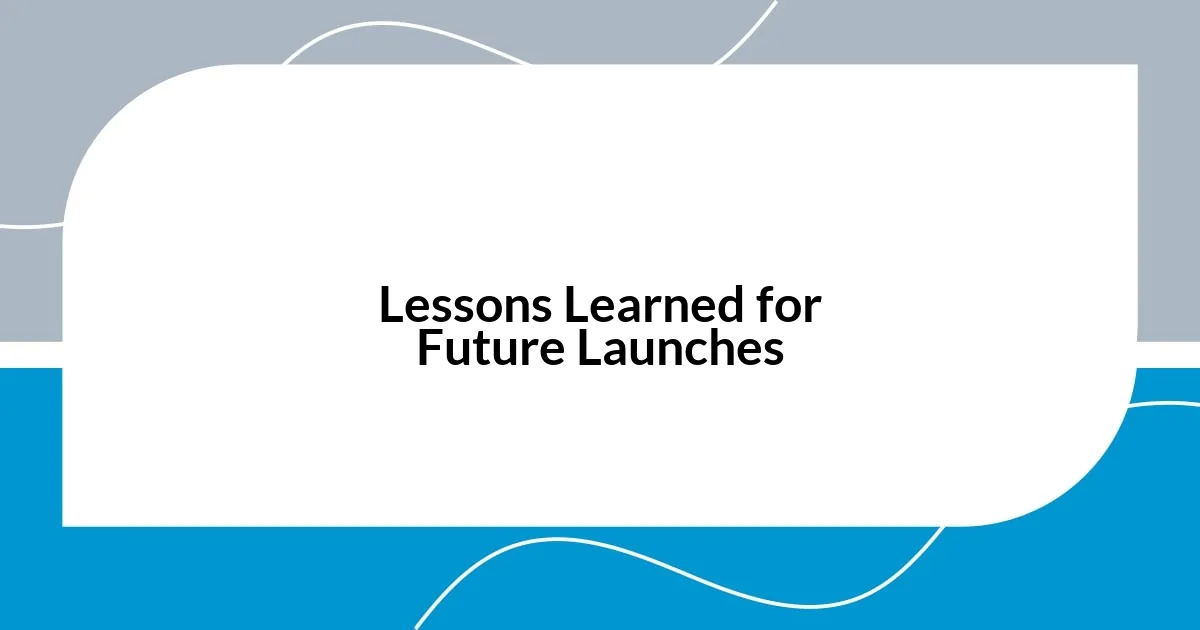
Lessons Learned for Future Launches
One key lesson I learned for future launches is the importance of timing. Initially, I launched my book without considering market trends or current events. Looking back, I realized that aligning my launch with related events or themes could have amplified engagement. For instance, if I had timed it with a relevant online discussion, it would’ve given me an unexpected boost in visibility. Have you ever thought about how timing can enhance your project’s impact?
Another valuable insight was the significance of a dedicated launch team. At first, I relied solely on my social media following, but I soon recognized that having a group of enthusiastic supporters made a difference. They became my cheerleaders and spread the word more effectively than I could alone. I remember one friend who shared my book with her book club, which generated genuine buzz and excitement that I didn’t expect. Building a community of passionate advocates makes the journey feel less solitary, don’t you think?
Finally, I discovered that planning ahead is crucial for success. During my first launch, I felt like I was juggling a dozen tasks at once. However, when I took the time to outline my marketing strategy and set clear goals, everything became more manageable. I remember feeling like a weight had been lifted off my shoulders as I streamlined my approach. It was such a relief to know I had a roadmap. How chaotic have your launches felt? Embracing organization leads to a smoother experience, allowing creativity and inspiration to shine through.